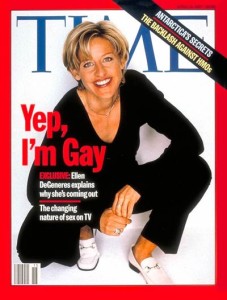Ian Thorpe was just 15 when he was first asked about his sexuality by the media. As he grew into a man and conquered the swimming world – winning five Olympic gold medals for Australia– the questioning never stopped.
The answer was always the same: I am not gay.
Now 31, the swimmer said the words he had been avoiding …‘I’m a gay man.’
(London Guardian, July 13, 2014)
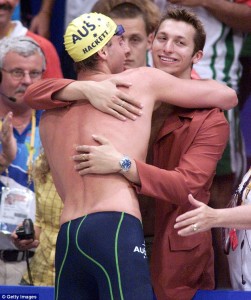 Frankly, I’m dismayed by the way Ian Thorpe is being celebrated for finally coming out as a gay man, especially given that this is about as revealing as Bill Clinton finally coming out as a cheating spouse. Hell, even my comically imprecise gaydar had him pegged way back when he was cruising at the 2000 Olympic Games.
Frankly, I’m dismayed by the way Ian Thorpe is being celebrated for finally coming out as a gay man, especially given that this is about as revealing as Bill Clinton finally coming out as a cheating spouse. Hell, even my comically imprecise gaydar had him pegged way back when he was cruising at the 2000 Olympic Games.
Yet:
The interview, broadcast on Australia’s Channel Ten, prompted a wave of congratulations that appeared to challenge the sport-obsessed nation’s traditional reputation as blokey, macho and blithely intolerant.
An editorial in Sydney’s Sunday Telegraph, the nation’s biggest selling newspaper, congratulated Thorpe’s decision to come out ‘at a time of his choosing’.
(The London Telegraph, July 13, 2014)
Let me hasten to clarify that I do not mean to diminish the personal struggle any homosexual has coming to terms with his/her sexual orientation. But it seems perverse to continue hailing people for doing so, especially when their coming out seems calculated more to curry public favor than to be true to themselves.
By instructive contrast, when Ellen had the balls way back in 1997 to say, “I’m gay,” she was at the pinnacle of her professional career and still a figure of considerable public interest. And, given the prevailing climate of homophobia, she had a lot to lose. But she was clearly more interested in being true to herself than in currying public favor. That was 17 years ago folks!
More to the point, thousands of public figures have emulated her pioneering coming out since then. Therefore, it seems more than a little patronizing – towards the person coming out as well as the public – for the media to continue covering people coming to terms with their own sexuality as a friggin’ news event.
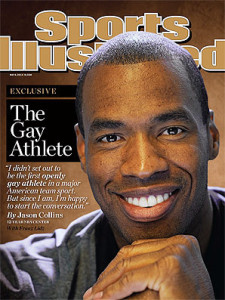 But this is particularly annoying, if not cynical, in Thorpe’s case. After all, his “public service announcement” would’ve had some socially redeeming value if he had emulated Ellen by coming out at the height of his career – during the 2000 Olympic Games in Sydney, where he was born. Instead, he chose to emulate the equally opportunistic, if not cowardly, Jason Collins.
But this is particularly annoying, if not cynical, in Thorpe’s case. After all, his “public service announcement” would’ve had some socially redeeming value if he had emulated Ellen by coming out at the height of his career – during the 2000 Olympic Games in Sydney, where he was born. Instead, he chose to emulate the equally opportunistic, if not cowardly, Jason Collins.
Apropos of which, here, in part, is how I expressed my dismay over the way Jason Collins was being celebrated for finally coming out last year:
Collins is a 12-year journeyman who has played for six NBA teams, and is currently looking for his seventh. Therefore, his courageous stand is undermined by the fact that he waited to take it on his way out of the league…
Not to mention that Billie Jean King and Martina Navratilova blazed this gay trail for female professional athletes decades ago; or, for an even greater profile in courage, that Britney Griner, the top pick in the 2013 WNBA Draft, came out in her own Sports Illustrated feature just weeks ago.
This is why, with all due respect to Collins, I’m reserving my unqualified praise for the male professional athlete who has the courage to come out when he still has skin in the game.
(“NBA Player Comes Out as Gay. Great! But Courageous?” The iPINIONS Journal, April 30, 2013)
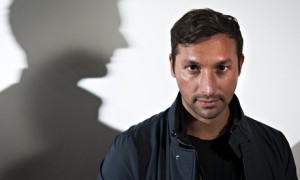 Meanwhile, nothing betrays how surreal and misleading media coverage of Thorpe’s coming out is quite like googling “Thorpe denies he’s gay” and being bombarded with results heralding some version of “Thorpe admits he’s gay.” Try it.
Meanwhile, nothing betrays how surreal and misleading media coverage of Thorpe’s coming out is quite like googling “Thorpe denies he’s gay” and being bombarded with results heralding some version of “Thorpe admits he’s gay.” Try it.
Whereas, in fact, he didn’t just avoid addressing questions about his homosexuality, the way Ellen did, he repeatedly denied being gay with more self-righteousness than Peter exhibited when he denied knowing Jesus Christ.
Here, for example, is how he dismissed a question about his sexuality during an October 30, 2012 interview with Leigh Sales of the Australian Broadcasting Corporation:
Yeah, look, the thing that I find hurtful about it is that people are questioning kind of my integrity and what I say. That’s the only part that I find hurtful. Like is that, you know, this is something that I would be embarrassed about, that I would hide or whatever else.
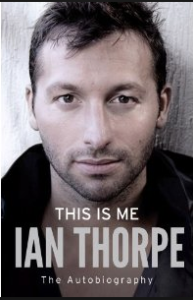 The interview was part of the promotion for his purportedly confessional autobiography, This Is Me, in which he chronicled his bouts with depression and suicidal ideations. Except that he failed not only to include the most conspicuous confession he had to make (i.e., about being gay), but also to admit that whatever depression and suicidal ideations he suffered probably stemmed from the stress caused by living a closeted life so publicly.
The interview was part of the promotion for his purportedly confessional autobiography, This Is Me, in which he chronicled his bouts with depression and suicidal ideations. Except that he failed not only to include the most conspicuous confession he had to make (i.e., about being gay), but also to admit that whatever depression and suicidal ideations he suffered probably stemmed from the stress caused by living a closeted life so publicly.
For the record, I am not gay and all my sexual experiences have been straight. I’m attracted to women, I love children and aspire to have a family one day.
(‘This Is Me’, 2012)
Which is why, instead of hailing him as ‘brave,’ reporters should demand to know if he intends to issue refunds to everyone who bought his autobiography. Because, even though it did not contain a million little lies, a la James Frey, this boldfaced lie is sufficient to render every other word in his book utterly worthless.
Not to mention the public apology he owes a number of women, like the appropriately named but unwitting Amanda Beard, for implicating them in his web of denials by willfully mischaracterizing their friendship as a “relationship.”
Related commentaries:
NBA player…
* This commentary was originally published yesterday, Tuesday, at 5:45 pm

